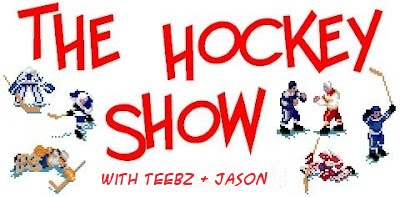The Hockey Show - Episode 618
The Hockey Show, Canada's only campus-produced radio show that strictly talks hockey, is veering off its normal course of following the news and discussing major topics tonight for something a little more fun. In passing, Jason had mentioned the old McDonald's NHL mini goalie masks as he had seen a few for sale at a consignment store, and he and Teebz got to chatting about them prior to the last show they did in-studio before the renovations. There were many "do remember those" comments, and that's how we got here where our hosts will dive deep into NHL-McDonald's promotions tonight on The Hockey Show at 5:30pm CT!
Regardless of your stance on McDonald's and their food, it's hard to deny that they are a marketing force when it comes to toys and promotional products. Tonight, Teebz and Jason jump squarely into that world as they look at the run of McDonald's hockey cards and some of the interesting things found there, the NHL mini goalie masks and the story behind them, and the crossover the NHL and the Muppets did that brought McDonald's in as a third party to that promotional push. The entire show is dedicated to NHL-McDonald's promotions as the two hosts look at three fun campaigns from the mid-1990s, have some discussion surrounding those campaigns, and hopefully stir up some memories for listeners tonight on The Hockey Show at 5:30pm CT on one of 101.5 FM, Channel 718 on MTS TV, or via UMFM.com!
If you live outside Winnipeg and want to listen, we have options! The new UMFM website's online streaming player works well if you want to listen online. We also recommend Radio Garden if you need an easy-to-use online stream. If you're more of an app person, we recommend you use the TuneIn app found on the App Store or Google Play Store. It's a solid app.
If you have questions, you can email all show queries and comments to hockeyshow@umfm.com! Tweet me anytime with questions you may have by hitting me up at @TeebzHBIC on Twitter! I'm here to listen to you, so make your voice heard!
Tonight, Teebz and Jason chat hockey cards, goalie masks, french fries, Muppets All-Stars, jingle controversy, promotions, and much more exclusively on 101.5 UMFM and on the UMFM.com web stream!
PODCAST: July 25, 2024: Episode 618
Until next time, keep your sticks on the ice!
Regardless of your stance on McDonald's and their food, it's hard to deny that they are a marketing force when it comes to toys and promotional products. Tonight, Teebz and Jason jump squarely into that world as they look at the run of McDonald's hockey cards and some of the interesting things found there, the NHL mini goalie masks and the story behind them, and the crossover the NHL and the Muppets did that brought McDonald's in as a third party to that promotional push. The entire show is dedicated to NHL-McDonald's promotions as the two hosts look at three fun campaigns from the mid-1990s, have some discussion surrounding those campaigns, and hopefully stir up some memories for listeners tonight on The Hockey Show at 5:30pm CT on one of 101.5 FM, Channel 718 on MTS TV, or via UMFM.com!
If you live outside Winnipeg and want to listen, we have options! The new UMFM website's online streaming player works well if you want to listen online. We also recommend Radio Garden if you need an easy-to-use online stream. If you're more of an app person, we recommend you use the TuneIn app found on the App Store or Google Play Store. It's a solid app.
If you have questions, you can email all show queries and comments to hockeyshow@umfm.com! Tweet me anytime with questions you may have by hitting me up at @TeebzHBIC on Twitter! I'm here to listen to you, so make your voice heard!
Tonight, Teebz and Jason chat hockey cards, goalie masks, french fries, Muppets All-Stars, jingle controversy, promotions, and much more exclusively on 101.5 UMFM and on the UMFM.com web stream!
PODCAST: July 25, 2024: Episode 618
Until next time, keep your sticks on the ice!














